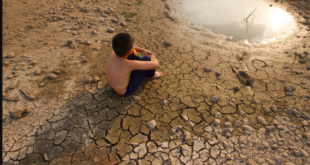 Dr. Seema Javed
Dr. Seema Javed
The latest Lancet Countdown report underscores the imperative for a health-centred response in a world facing irreversible harms.
Climate inaction is costing lives and livelihoods today, with new global projections revealing the grave and mounting threat to health of further delayed action on climate change.
But bold climate action could offer a lifeline for health.This year’s report launches just weeks before the COP28 which has a health focus for the first time.
The findings underscore the opportunity of a lifetime that COP could help deliver – through commitments and action to accelerate a just transition. Without profound and swift mitigation to tackle the root causes of climate change and to support adaptation efforts, the health of humanity is at grave risk.
2023 Report tracks the relationship between health and climate change across five key domains and 47 indicators, providing the most up-to-date assessment of the links between health and climate change.
At 1.14ºC of global heating, the risks of climate change are rapidly growing, costing lives and livelihoods worldwide, today. Health systems are increasingly strained, and failure to support equitable adaptation has left populations unprotected in the face of the increased climate hazards. Those who contributed the least to global emissions are being hit hardest.
But this could be just a glimpse into an increasingly dangerous future, with all risks projected to soar even in a world of 2ºC of heating. Tackling greenhouse gas emissions, and ensuring climate-related health hazards don’t exceed the capacity of health-supportive systems to adapt, is a health imperative.
The Lancet Countdown is an international research collaboration that independently monitors the evolving impacts of climate change on health, and the emerging health opportunities of climate action. In its eighth iteration, this 2023 report draws on the expertise of 114 scientists and health practitioners from 52 research institutions and UN agencies worldwide to provide its most comprehensive assessment yet through 40+ peer-reviewed indicators. Since 2016, these indicators have provided regular, reliable global and regional stock takes on climate change .
Alarming new projections reveal soaring health risks of persistent global inaction over the climate emergency
● New global projections in the 8th annual report of the Lancet Countdown on Health and Climate Change reveal the grave and mounting threat to health of further delayed action on climate change, with the world likely to experience a 4.7 fold increase in heat-related deaths by mid-century.
● Report also highlights how climate inaction is costing lives and livelihoods today. In 2022, individuals were, on average, exposed to 86 days of health-threatening high temperatures, of which 60% were made at least twice as likely to occur because of human-caused climate change.
● Authors call out “negligence” of governments, companies, and banks who continue investing in oil and gas as the challenges and costs of adaptation soar, and the world approaches irreversible harm. They warn that without profound and swift mitigation to tackle the root causes of climate change, the health of humanity is at grave risk.
● New regional section of the report highlights the different and unequal experience of the health impacts of climate change, and who is benefiting from climate change adaptation and the health co-benefits of the clean energy transition so far. Authors outline the opportunity that a just energy transition offers to reduce health inequities and improve the health and wellbeing of all populations.
● Authors argue the stark findings must force urgent health-centred climate action to shift the global economy to a zero-carbon footing while delivering “transformative opportunities” to improve the health of world populations through improved energy access and security, cleaner air, safer drinking water, healthier diets and lifestyles, and more liveable cities.
Impacts in India: As far as Impacts on India is concerned -Trends in heat and health are particularly concerning, with populations experiencing increases in exposure to high temperatures, undermining livelihoods and threatening people’s health and wellbeing. Populations are vulnerable to the effects of sea-level rise,flooding, and drought, threatening both direct health impacts as well as indirect impacts of reduced crop-yields and population migration and displacement.Climatic conditions have grown increasingly suitable for the spread of vector-borne diseases including dengue and malaria.
 Jubilee Post News & Views
Jubilee Post News & Views





